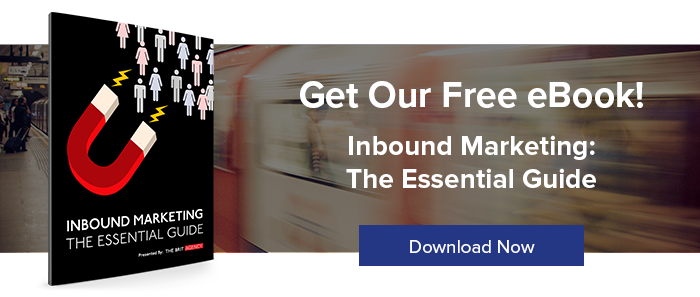These days, protecting private information is incredibly important, so making sure your Inbound Website doesn't get compromised by cyber attacks and hacking should be a top priority for your business. Your website visitors want to be assured they can safely and securely browse your website and trust your content and more importantly trust you!
Personal data breaches or privacy incursions can have a huge negative impact on your business and customer experience, generating unwanted media attention and none of us want that.
So, what can you do to make sure your Inbound Website is secure?
One of the easiest ways to make your Inbound Website secure is to have an official SSL (Secure Socket Level) certificate enabled for your website (so your URL prefix address changes to HTTPS://). The green padlock symbol next to the URL can give the user peace-of-mind that the website is safe and secure. Google is now actively encouraging you to add SSL, as it indicates the owner of the website is properly and responsibly addressing security; In return, Google will give preferential search engine rankings to those who have SSL.
A SSL certificate is only issued by a legitimate SSL certificate authority, letting you and your web browser know that the domain is genuine and can’t be intercepted, viewed or read by anyone else. Your web browser will let you know if a site is not encrypted - and therefore not safe.
That's why SSL certificates are mandatory for every website we build, so that every transaction is secure, be that filing a form or online purchase.
If your website collects any user data, such as forms, logins or subscription lists, then you should have a SSL certification to show your users that you value their visit, and you will protect their privacy.
It is recommended for even basic websites to have this certification, as it adds a layer of trust, discretion, and security, as certain browsers will recommend visitors steer clear of unprotected websites.
Here a few of the reasons why you need to use an SSL certificate for your Inbound Website:
- Search engines, like Google, will give your site a higher search ranking for having an SSL certificate.
- Google and Chrome will flag your website as not secure if you do not have an SSL certificate.
- HubSpot provides a free SSL certificate for every website hosted in its Content Management System (CMS) - HubSpot COS.
- WordPress for example, will soon require hosts to have HTTPS:// available for some features to work.
- If you take credit card data, you are required to have a secure connection for PCI DDS Compliance (Payment Card Industry Data Security Standard).
If your website engages visitors in any form of e-commerce, then you absolutely must have SSL. Even if all your e-commerce is done on another platform (such as PayPal) customers may still want to know they are on a secure website before they decide to purchase anything.
Different Types of SSL Certificates
Now we will move into some of the technical stuff behind SSL certificates as not all SSL certificates are equal.
SSL certificates will not only validate your domain, but some also validate the organization that owns the domain, preventing those phishing websites from having any impact. This makes it known that the people who own the domain are who they say they are, and even their address and phone number are verified to get this extended validation.
Here are some of the different types of SSL certificates:
DV (Domain Validated) SSL certificates – this is the fastest and least expensive certification to have.
EV (Extended Validation) SSL certificates – this takes longer for validation, but it also validates the organization that owns the domain. This usually shows in a browser as a green address bar with the organization’s name.
OV (Organization Validation) SSL certificates – this is a between the DV and EV, the site gets more validation than the DV, but not as much as the EV. To viewers of the site, it appears the same as the DV.
Wildcard certificates – these certificates will also validate the subdomains of the site.
Multi-Domain, UCC (Unified Communications), or SAN (Subject Alternative Name) SSL certificates– these certificates will validate multiple domain names. Self signed SSL certificates – a certificate authority does not validate the domain, but the traffic is encrypted the same way that validated sites are encrypted. This usually causes your web browser to refuse to display the website unless you add it as an exception (This should only be used for testing).
In conclusion, trust is the foundation of your relationship with your website visitors, and customers. With SSL enabled, you can build trust with people visiting your website, ensuring their information is safe. Visual cues on an SSL enabled website clearly show the visitor you value their safety and protecting information from potential hackers.
Therefore, here at The Brit Agency, our policy is to add SSL to all the websites we manage, and enable SSL across all content - such as website pages, landing pages, and the blog.
THE BRIT AGENCY is a B2B Inbound Marketing Agency providing Inbound Marketing, Inbound Website Design and Inbound Sales services to companies around the world. We're focused on growing website traffic, qualified leads and sales, using the Inbound lead generation and marketing automation process.
THE BRIT AGENCY is a Certified Platinum Tier Hubspot Partner, a HubSpot COS certified Inbound Website Design Agency, a Shopify eCommerce Partner, and a certified "Google Badged Agency Partner". We have offices in Toronto and Barrie, Canada, and Salisbury, UK.


